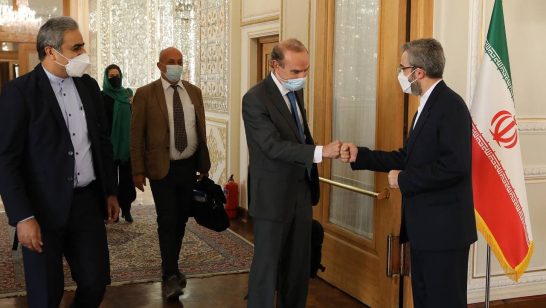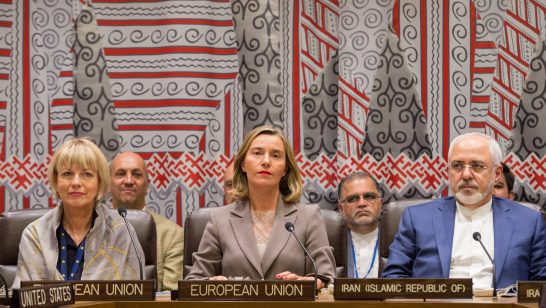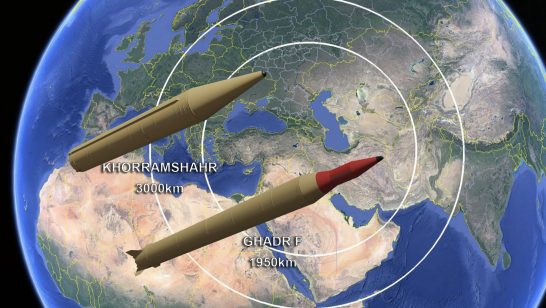
As the international community eagerly watches the final stages of negotiations over the future of the Joint Comprehensive Plan of Action (JCPOA), commonly known as the Iran nuclear deal, in Vienna, senior officials from the United States, Europe, and Iran are attending the Munich Security Conference this weekend. While the presence of US Secretary of State Antony Blinken and Iranian Foreign Minister Hossein Amir-Abdollahian in the same room would seem to be a perfect opportunity to bridge the remaining gaps, it is highly unlikely they will cross paths. After its experience under the Trump administration, Iran sees zero basis for speaking directly to the United States and has opted for nearly a year of indirect negotiations that have slowly inched closer to an agreement. Finally, one seems to be within reach.
As one of President Biden’s campaign promises that enjoys broad support from the American public, reviving the JCPOA would mean Iran would once again place its nuclear program under strict limits, enforced through extensive verification and monitoring by the International Atomic Energy Agency. In return, the United States would lift painful sanctions that have caused significant economic hardship in Iran over the last three years. Yet even as a range of officials point to progress in the talks, most observers remain focused on what might happen if the talks are derailed, speculating about Biden’s options for Plan B as he faces the risk of renewed tensions, a nuclear crisis, and even war. But what happens if Plan A works? That question needs more serious consideration, especially as the talks are increasingly likely to succeed.
When entering office, Biden and his team argued that there was a smarter way to get tough on Iran: restore the original nuclear deal to contain and roll back Iran’s nuclear advances and then pursue a “longer and stronger” agreement. Senator Bob Menendez criticised the administration on the Senate floor earlier this month, stating “I have yet to hear any parameters of ‘longer’ or ‘stronger’ terms or whether that is even a feasible prospect.” Critics like Menendez have pointed to the need to curtail Iran’s ballistic missile program and support for proxy groups–things the nuclear deal does not do. Other Republican lawmakers have joined him, calling for the Biden administration to reverse course and pursue what they feel would be a “better” deal with Iran, listing a range of maximalist demands reminiscent of the Trump era, even though that approach only generated an expansion of Iran’s nuclear program and increased regional tensions. Such calls will be on full display in Munich, with Senator Lindsay Graham expected to outline a proposal to end all Iranian uranium enrichment, reviving a failed negotiating position that Tehran would never agree to.
For Iran, giving up its pursuit of nuclear energy has always been a non-starter, and there will be little appetite to expand the scope of the JCPOA or build on the deal’s terms in the near future. Iran’s experience with the nuclear deal has been a bitter one. In early 2018, just two years after the deal’s implementation, President Trump unilaterally violated the JCPOA despite it being enshrined in a UN Security Council Resolution. Iran was certified as being in full compliance with its commitments, but Trump quit anyway. He reimposed secondary sanctions to the dismay of the remaining participants, including European allies that desperately tried to persuade him not to do so. Iran, thrust into a deep recession that only recently ended, remained in compliance with the agreement for a further year, eventually opting to build its own leverage by slowly resuming nuclear activities prohibited by the agreement.
As it now pursues the nuclear deal’s restoration, the Raisi administration is understandably concerned about the credibility of American commitments. There is a real chance that a new US president could “tear up” the nuclear deal again in the future, and the lack of legal and political guarantees that President Biden or his deeply divided Congress can offer Iran to prevent that is making it harder to bring negotiations to a successful conclusion. Even if Iranian leaders accept that such guarantees are not possible and take the deal for what it is, they will resist efforts to strengthen or lengthen the JCPOA or to strike an entirely new agreement without first seeing whether the rehabilitation of the deal delivers its intended benefits. In effect, it would be an error for the United States to push for a “stronger and longer” deal straight away, especially as it lacks the leverage, credibility, and bandwidth to pull it off.
But even if the United States remains unable to pursue a new agreement with Iran in the short term, the Biden administration can still use diplomacy to address the concerns that extend beyond Iran’s nuclear program and are often cited by JCPOA critics. To do so, Biden should enlist allies and partners in Europe and the Middle East, and even Russia and China, to advance interests that they share with the US as part of their ongoing diplomatic outreach with Iran. Making sure US interests are represented in this ongoing diplomacy is smarter than pursuing the unrealistic goal of a “better” deal, especially given the enduring differences in opinion between Democrats and Republicans as to whether the JCPOA is a “good” deal in the first place. There are three diplomatic channels that the Biden administration can leverage over the next two years at a minimum.
First, the Biden administration can leverage the remarkable dialogues taking place between Iran and its Arab neighbours. US partners in the region, namely, Qatar, the United Arab Emirates, and Saudi Arabia have all increased their bilateral engagements with Iran, seeking to directly address concerns stemming from Iran’s security policies and posture as part of a regional push for de-escalation. Iraq has also hosted multiple regional actors including Iran for wider, multilateral discussions. That these countries are taking responsibility for reducing threats, rather than outsourcing this work to external powers such as the United States, is a positive development that the Biden administration ought to encourage. In contrast to when the JCPOA was first achieved, Gulf countries are now welcoming deeper economic ties with Iran. In turn, a priority should be to make sure that US sanctions relief helps further enable the ongoing nascent economic diplomacy between Iran and its neighbors.
Second, while Iran’s relations with the so-called E3 – the United Kingdom, France and Germany – are strained, the leadership of the European Union has been critical in creating diplomatic space for renewed talks on the JCPOA. If the deal is restored, the EU will continue to play an important role not only in coordinating the implementation of the deal, but also in facilitating dialogue on a wider set of issues. Part of the reason the EU can play this role is because of the constructive relations that many of its member states enjoy with Iran and because of the significant role Europe continues to play in the Iranian economy, a role that will be boosted if the US re-enters the JCPOA and lifts secondary sanctions.
Third, while the US is concerned by the growing strategic security relationships that Russia and China have with Iran and lacks a common view with them on many aspects of Iran’s domestic and foreign policies, when it comes to supporting the JCPOA and upholding peace in the Persian Gulf, Iran is a rare issue on which Washington finds its interests with Moscow and Beijing largely aligned. In particular, it is notable that Russia and China have played a constructive role in the negotiations over the future of the JCPOA. Moscow has leveraged its relationship with Tehran and its deep technical expertise in non-proliferation to facilitate indirect talks between the United States and Iran. China has also leveraged its unique economic relationship – as Iran’s only current major oil customer – in order to encourage Tehran to remain committed to the JCPOA talks. Both countries will remain important players in both the nuclear and economic arenas, and Russia and China have both proposed frameworks to improve security in the Persian Gulf. If the JCPOA gets back on track, those proposals should be explored, potentially under the auspices of the United Nations.
To take advantage of these three diplomatic channels, the Biden administration should follow two simple rules: don’t complicate the politics and don’t prevent the economics. After the damage generated by his predecessor, Biden lacks the credibility and bandwidth necessary to embark on expansive new negotiations. His critics in Washington know this and are setting him up to fail. Still, Biden has the means to make progress with Iran. In his aforementioned speech, Menendez insisted that “multilateral cooperation is critical to finding a successful outcome.” That is true. But the “multilateral sanctions efforts” Menendez called for are not the only kind of cooperation that Biden can pursue.
As world leaders gather at the Hotel Bayerischer Hof in Munich this weekend, they should not let perfect become the enemy of good. If Plan A succeeds, and the JCPOA is restored, new channels will open for multilateral diplomacy with Iran. These channels will not necessarily lead to a “better” or “stronger and longer” deal and the Biden administration will not be a participant in all of the talks. But leveraging the efforts of partners, allies, and other great powers to address US interests is a better way to advance national security through diplomacy and create an environment where future deal-making can become more of a possibility.
The opinions articulated above represent the views of the author(s) and do not necessarily reflect the position of the European Leadership Network or any of its members. The ELN’s aim is to encourage debates that will help develop Europe’s capacity to address the pressing foreign, defence, and security policy challenges of our time.
Image: Iran Press




